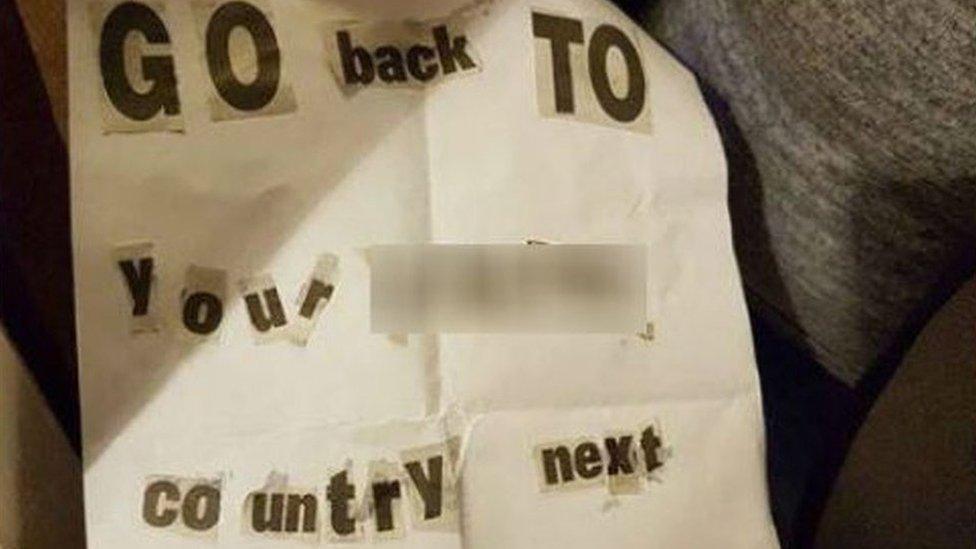Call for stronger approach to tackling hate crime in Scotland
- Published
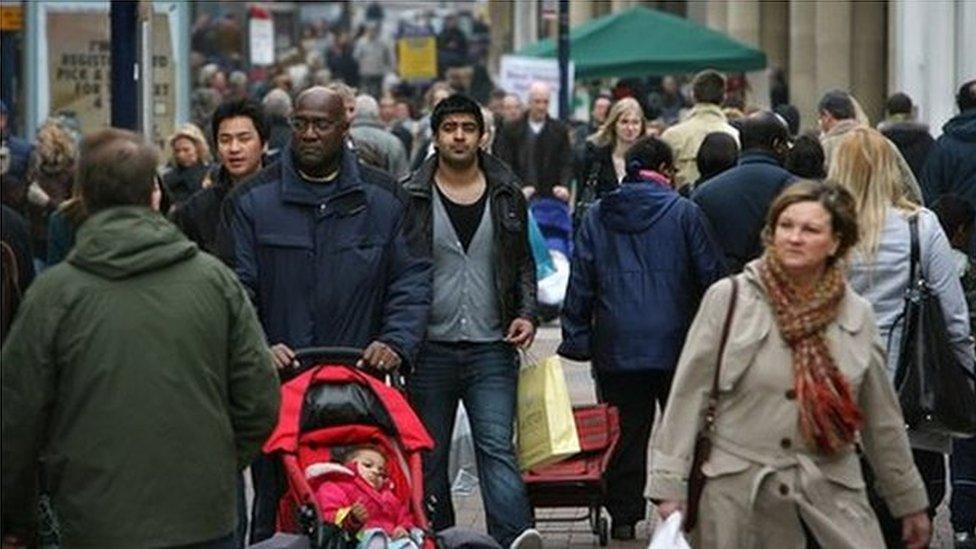
Hate crime has an impact right across society, the report said
An independent review has called for a stronger approach to tackling hate crime in Scotland.
The advisory group set up by the Scottish government in 2015 issued a report examining some of the "many changes" which need to be made.
The report, external said tackling hate crime should be "a priority concern for the whole of society".
The Scottish government said it contained "important messages that we should all reflect on".
A review of available evidence, external on hate crime for the Scottish Centre for Crime and Justice Research has warned that "there is a problem of hate crime in contemporary Scotland", adding that all stakeholders spoken to reported higher levels of hate crime than is recorded in official figures.
There have been concerns about an increase in hate crimes across the UK in the aftermath of the Brexit vote, although some reports have shown a reduction in such offences in Scotland.
However, the number of hate crime offences relating to football in Scotland have risen 49% in the past year.
'Disturbing evidence'
The Advisory Group on Hate Crime, Prejudice and Community Cohesion was established in 2015 to provide advice and analysis on the issue.
Their report notes that racist offences are the most prominent hate crime category, but have been falling slightly while reports of offences based on sexual orientation had increased 20% in the past year.
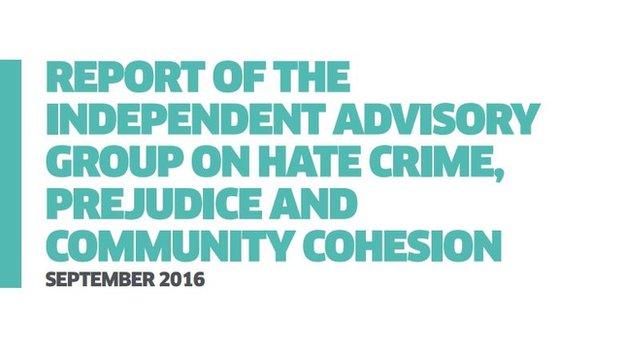
The report makes a series of recommendations about tackling hate crime
It said the Scottish government's approach was "widely appreciated", but said that while the criminal justice system was seen to take the matter seriously, the system "continues to feel disjointed from the perspective of many victims".
The group also heard "disturbing" evidence about the "rapidly growing" phenomenon of online abuse, and warned that too often offenders are not challenged.
They recommended a multi-agency approach, with groups from across government and society treating hate crime as a high priority.
Specific recommendations include:
a clearer definition of hate crime
a review of existing criminal law to protect victims
better monitoring and response to online hate crime
more work to address prejudice and hate crime in schools through the Curriculum for Excellence
improved data collection
joint work by the government and Police Scotland to identify and break down barriers to reporting hate crime
Chairman Dr Duncan Morrow said it was clear that "hatred and prejudice continue to have very serious consequences for people and communities across society".
He said: "Prejudice and hate have a huge impact on the quality of life of individuals the community to which they belong. Trust becomes more difficult, and whole families and groups withdraw into smaller circles of safety with huge consequences for the overall level of trust and social capital across the whole of society.
"Even worse, this degree of isolation and fear is a threat to the basic values of an open democratic society and undermines the rule of law and the principle of equality under the law.
Dr Morrow added that alienation of minority groups "can lead directly to radicalisation and violence and contribute further to the stability of society as a whole and the quality of life of everyone".
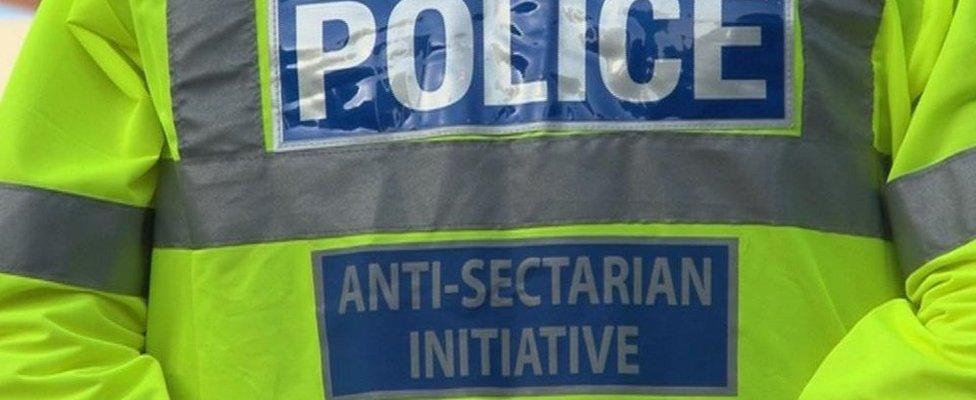
The number of hate crime offences reported at football matches have increased sharply in recent years
Equalities Secretary Angela Constance welcomed the work of the group.
She said: "As a nation, we have a long history of welcoming people of all nationalities and faiths, and we are committed to supporting their integration into our communities. That has assumed even more importance in the aftermath of the EU referendum, when it is vital that we send a message that Scotland remains a welcoming place for all those who have chosen to make this country their home.
"I recognise that there is still progress to be made, and we will be carefully considering the recommendations from the advisory group in full."
'Zero tolerance'
The report was welcomed by a number of equalities groups.
The Equality and Human Rights Commission in Scotland said it was important there was "coordinated leadership", saying a "zero tolerance approach" could isolate offenders.
Director Alastair Pringle said: "This is fundamentally a responsibility for all of us in Scotland. We all have a part to play, from the Scottish government, to our schools, to our workplaces, to each of us all as individuals.
"I was struck by a recent reported case where several passengers complained about the offensive behaviour and racist language from other passengers on a flight to Ibiza. This resulted in their removal from the flight.
"I think this demonstrates exactly how we can make a change in society by refusing to be a bystander, showing responsible leadership by example and speaking up and being an active citizen."
LGBTI charity the Equality Network particularly welcomed the focus on education in the report.
Policy coordinator Hannah Pearson said: "We welcome the report's recognition that hate crime can only be fully tackled by addressing prejudice and improving community cohesion more widely, including through school education.
"All schools should be inclusive and welcoming of diversity, including LGBTI people."
- Published18 September 2016
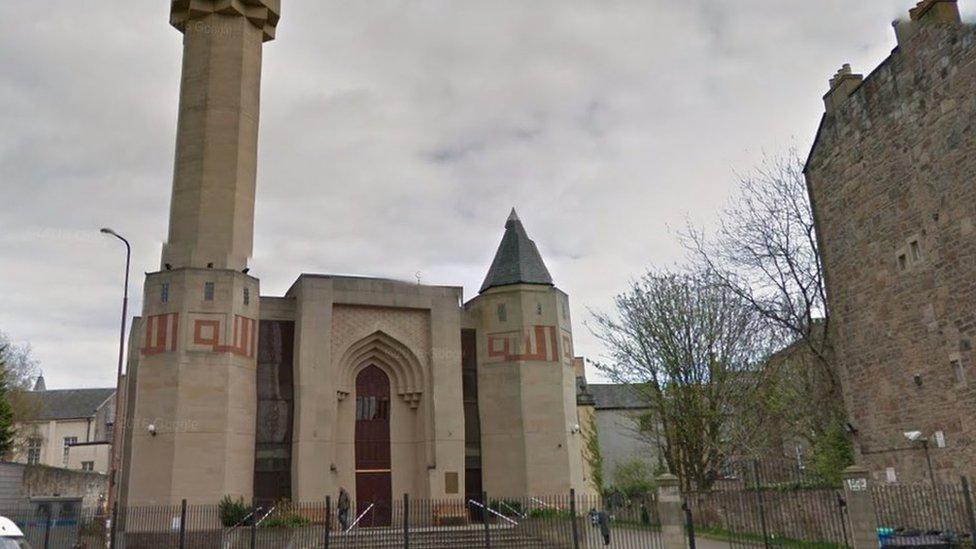
- Published10 June 2016

- Published8 July 2016
